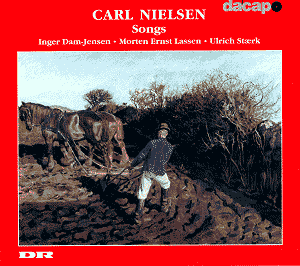Carl Nielsen is now well established as a composer
of major international significance. However, there are some aspects
of his art, and in particular his songs, which do not travel so
well as his larger orchestral works. The reason for this seeming
imbalance is not hard to understand: it is that Danish is not
among the international languages of music, and singers find it
difficult to grasp. Nor do songs take readily to translation,
with the best will in the world.
This makes the present disc the more useful as
an addition to the catalogue. For song writing formed an important
aspect of Nielsen's creative work and engaged him at every stage
of his life. A pleasing feature of this well planned recital is
the way that the repertoire takes this range into account.
The package is beautifully presented, with a
well planned booklet attached to the box, and there are full texts
and translation (Danish-English) printed in very clear type.
It is often the case that a distinctive national
musical style relies upon folksong, and the freshness of Nielsen's
songs forms a central feature of his approach. This is not to
suggest, however, that the folk song style was the only important
part of his work as a song composer. As a young man, for example,
he made a close study of the songs of Brahms, and it shows. The
first items in this collection, his Opus 4 group of five songs
to words by the contemporary poet Jacobsen, resulted from this
enthusiasm. Several of them were composed while he was on his
honeymoon in Italy, and he goes out of his way to relate closely
to the texts. The clear focus of the recorded sound is a feature
of this collection, so too the enunciation of both the singers.
Directness and simplicity of style numbers among
Nielsen's priorities, and both Inger Dam-Jensen and Morten Ernst
Lassen respond to the music's freshness with much sensitivity.
Nowhere, surely, can this be better experienced than in the final
item in this sequence, the duet Min síde balsambísse,
a song taken in 1906 from the comic opera Maskarade. The
whole number is pure delight, including the pacing and delivery
of Ulrich Staerk's piano accompaniment.
If there is a weakness, or rather a danger for
the unwary listener, it is that an unbroken hour of Nielsen's
songs may lack the variety to sustain its presence. But group
the songs in shorter sequences and the results are quite different.
They can be most uplifting, even from relatively early in his
career. For a pair of real gems, try two contrasting numbers (one
soprano, one baritone) from the Opus 6 songs, also to words by
Jacobsen: Silken Shoes (Track 8) and An Age of Regret
(Track 9).
Terry Barfoot
